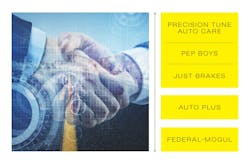For years, increasing consolidation has gripped the auto care industry. Between 2006 and 2014, the Bureau of Labor Statistics claims shop compounded growth rate has only increased 0.4 percent. And each day, news alert after news alert details acquisition after acquisition, continuing a trend more than 10 years in the making.
And when Carl Icahn—billionaire investor, founder of Icahn Enterprises and president of Icahn Automotive Group—purchased 250 Precision Tune Auto Care locations in June 2017, giving him control of more than 1,000 auto repair shops, that trend gained some serious traction.
But not in the way people immediately realized, Jim Lang says.
"This is a different kind of consolidation,” says Lang, longtime industry analyst and president of Lang Marketing. “What Icahn is doing is called vertical integration.”
Contrary to horizontal integration, where firms control one component of a market or process, vertical integration engages multiple segments of production. So, as the owner of Pep Boys and Just Brakes as well, Icahn's intentions were clear to Lang: Those 1,000 shops will now buy their products from the Icahn-owned Auto Plus, which will buy its parts from the Icahn-owned Federal-Mogul, stretching Icahn’s pull in the marketplace.
And that scares Greg Sands, who has opened over 90 shops in his career with his company SRS & Co. and founded industry marketing firm Mudlick Mail. Partly because consolidation continues to grip the industry, but mostly because Icahn’s form of consolidation allows him to accomplish what many independent facilities struggle with.
The Rise of Vertical Integration
When you really think about it, it’s nothing more than a “drop in the bucket,” Lang says.
"[Icahn] purchased Pep Boys, Precision and Just Brakes. That's 1,000 outlets,” he says. ”That’s not much in a highly fragmented industry.”
What’s key here, instead, is the access Icahn has to multiple segments of the aftermarket. Other operations have done this as well, Lang says, including AAMCO, which partnered with Global Powertrain Systems and gained immediate access to its supply chain; Monro Muffler Brake & Service, which bought out Tire Barn Warehouse three years ago; and Bridgestone, which, as it turns out, was in a bidding war with Icahn for Pep Boys in late 2015.
Months earlier, Icahn had purchased Auto Plus. And just two months after securing Pep Boys, Icahn was back at it again, this time acquiring the rest of auto supplier Federal-Mogul’s stock (he had already owned 82 percent). These cycles often go unnoticed, Lang says, as they don’t fit in with the traditional perception of consolidation—the “horizontal” kind.
But now, by controlling thousands of shops and one of the industry’s biggest suppliers, Icahn’s threat to independent shops has amplified, Sands says.
“I’ve heard people in the industry say, ‘Oh, I think he will go out of business. He doesn’t know what he’s doing,’—the arrogance to say that,” Sands says. “Carl Icahn getting into our business is scary because he has the funds and resources to do what independents and franchises have failed to do for years.”
Icahn’s Advantage
Twenty years ago, there were very few Walgreens or CVS pharmacies, Sands says. Mostly, the market consisted of mom-and-pop outlets.
“Today, that's unheard of,” he says. “You see these huge chains. Now, that's what's happening in the dental industry—same deal in the automotive business.”
The main reason Walgreens and CVS won out, according to Sands? They offered conveniences the independents could not: better salaries and benefits for professionals, and longer hours for the public. Those would have been relatively minor, business-saving shifts for independent pharmacies—they’re also the kind of moves independent repair businesses fail to make, he says.
The vertical integration here is key. Because Icahn handles so many business segments, he’s able to better control costs and navigate funds throughout his companies, and use those companies to provide services and personnel to one another.
That’s why Sands doesn’t turn his nose up at the fact that Icahn bought 250 Precision Tune locations for only $35 million—just $140,000 per facility.
“That is a very low buy price. They're not top-performing stores,” Sands says. “But people don't realize that he's been in our industry long enough to know how to turn them around. Icahn has plenty of time to put in several managerial teams … or build his own proprietary financing arm. He has the funds to do whatever he wants.”
The Independents’ Advantage
There is one area, however, that Sands claims franchises have yet to figure out: Whoever wins the consolation race is the one who will effectively incentivize the limited supply of technicians.
"Everyone is too old school. Higher flat rates won’t work anymore,” Sands says. “The only way you'll win is with some kind of profit sharing program. You have to give techs a place at the table.”
While Sands believes independents must make other changes to compete with chains—such as raising labor rates, performing more oil and lube work, and extending shop hours into the evening and weekends—he says that by offering health benefits, shares in the company and competitive training investments, independent shops can remain in contention with giants like Icahn, who has yet to properly address the industry’s biggest issue.

